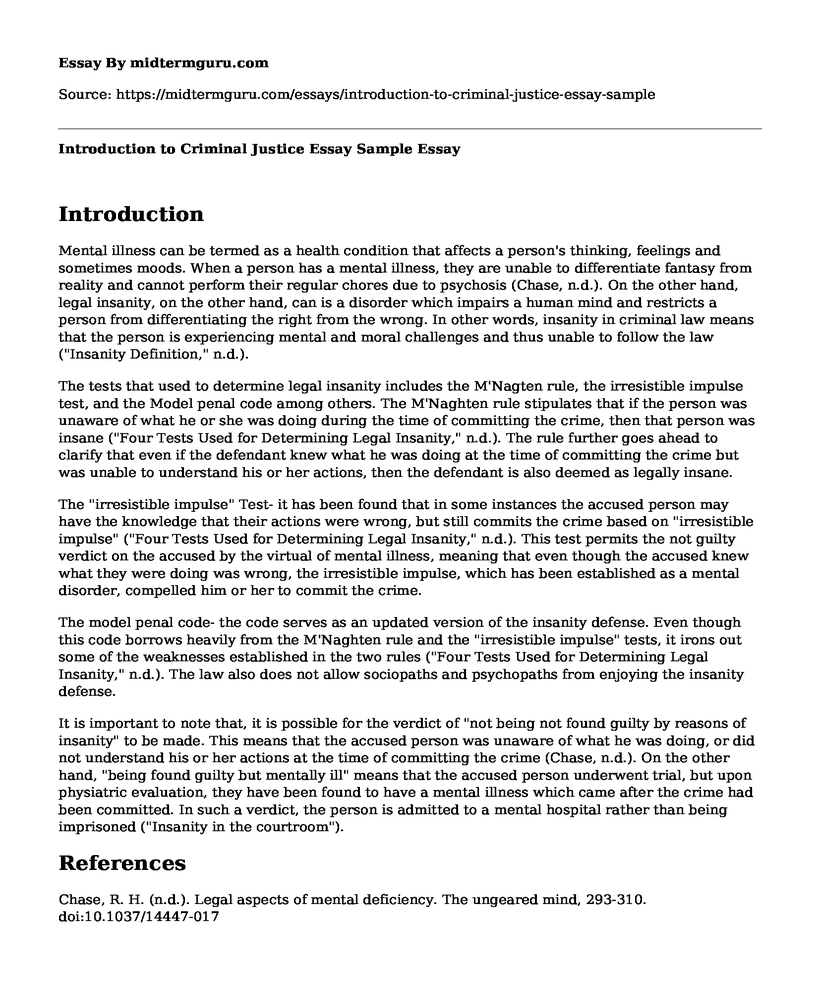Introduction
Mental illness can be termed as a health condition that affects a person's thinking, feelings and sometimes moods. When a person has a mental illness, they are unable to differentiate fantasy from reality and cannot perform their regular chores due to psychosis (Chase, n.d.). On the other hand, legal insanity, on the other hand, can is a disorder which impairs a human mind and restricts a person from differentiating the right from the wrong. In other words, insanity in criminal law means that the person is experiencing mental and moral challenges and thus unable to follow the law ("Insanity Definition," n.d.).
The tests that used to determine legal insanity includes the M'Nagten rule, the irresistible impulse test, and the Model penal code among others. The M'Naghten rule stipulates that if the person was unaware of what he or she was doing during the time of committing the crime, then that person was insane ("Four Tests Used for Determining Legal Insanity," n.d.). The rule further goes ahead to clarify that even if the defendant knew what he was doing at the time of committing the crime but was unable to understand his or her actions, then the defendant is also deemed as legally insane.
The "irresistible impulse" Test- it has been found that in some instances the accused person may have the knowledge that their actions were wrong, but still commits the crime based on "irresistible impulse" ("Four Tests Used for Determining Legal Insanity," n.d.). This test permits the not guilty verdict on the accused by the virtual of mental illness, meaning that even though the accused knew what they were doing was wrong, the irresistible impulse, which has been established as a mental disorder, compelled him or her to commit the crime.
The model penal code- the code serves as an updated version of the insanity defense. Even though this code borrows heavily from the M'Naghten rule and the "irresistible impulse" tests, it irons out some of the weaknesses established in the two rules ("Four Tests Used for Determining Legal Insanity," n.d.). The law also does not allow sociopaths and psychopaths from enjoying the insanity defense.
It is important to note that, it is possible for the verdict of "not being not found guilty by reasons of insanity" to be made. This means that the accused person was unaware of what he was doing, or did not understand his or her actions at the time of committing the crime (Chase, n.d.). On the other hand, "being found guilty but mentally ill" means that the accused person underwent trial, but upon physiatric evaluation, they have been found to have a mental illness which came after the crime had been committed. In such a verdict, the person is admitted to a mental hospital rather than being imprisoned ("Insanity in the courtroom").
References
Chase, R. H. (n.d.). Legal aspects of mental deficiency. The ungeared mind, 293-310. doi:10.1037/14447-017
The Four Tests Used for Determining Legal Insanity. (n.d.). Retrieved from https://thelawdictionary.org/article/four-tests-used-determining-legal-insanity/. Accessed 26th September 2018
Insanity Definition. (n.d.). Retrieved from http://www.duhaime.org/LegalDictionary/I/Insanity.aspx. Accessed 26th September 2018
Insanity in the courtroom: Mental illness and the search for justice. (2001). PsycEXTRA Dataset. doi:10.1037/e512112004-001
Cite this page
Introduction to Criminal Justice Essay Sample. (2022, Sep 06). Retrieved from https://midtermguru.com/essays/introduction-to-criminal-justice-essay-sample
If you are the original author of this essay and no longer wish to have it published on the midtermguru.com website, please click below to request its removal:
- Essay Example on the Crime Rates in Cities
- HIPPA Violence With Cases Discription - Paper Example
- The Role of Institutions Towards Health Promotion and General Human Life in the Society
- Essay Sample on Campus Carry Concealed Handgun Law
- Leadership Strategies for Advocacy - Essay Sample
- US: High Crime, High Inequality - Ecological Theory Explains Why - Essay Sample
- United Nations and Humanitarian Assistance - Essay Sample







